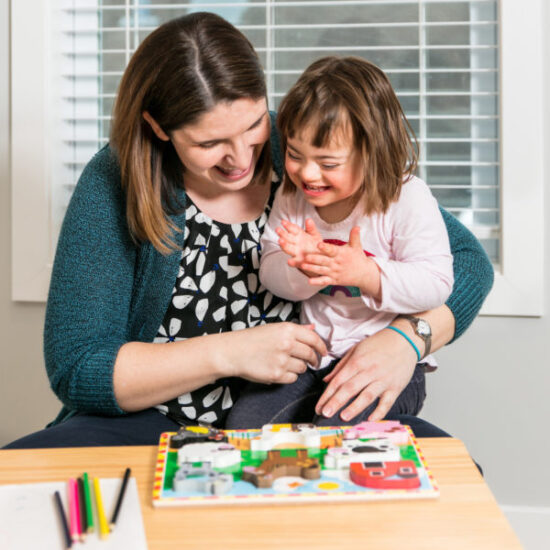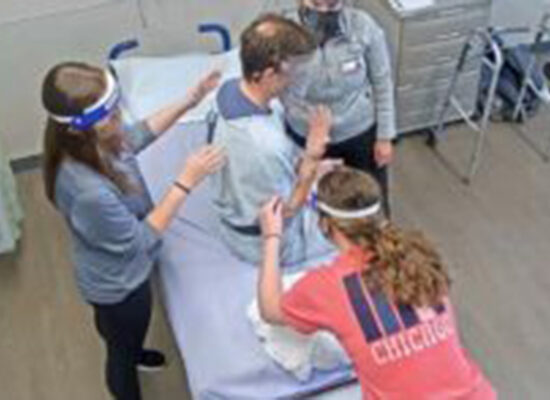Entry-level Occupational Therapy Doctorate
Learn to be the best occupational therapist you can be
UIC’s entry-level occupational therapy doctoral degree program is designed for students who have a bachelor’s or master’s degree in another subject and want to become occupational therapists. Our curriculum prepares you for the national certification exam and practice as an OT.
Learn to integrate occupational therapy practice, theory and research using our Scholarship of Practice model. Gain skills to engage in ethical, reflective and high-quality practice. Get ready to become a leader and advocate, and deliver best practice in a wide variety of settings.
We’re committed to helping you become a culturally responsive practitioner, able to meet your clients’ diverse occupational needs and achieve full participation in society, especially within under-resourced urban communities. You’ll get an education that prepares you to integrate occupational therapy practice, theory and research using our Scholarship of Practice (SOP) model. Complete your doctoral capstone with the support of your SOP Collaborative, a faculty-led group of students pursuing scholarly work in a specific area. Become a leader and advocate to serve individuals, families, groups and communities across the life span in a wide variety of settings. Our entry-level OTD program is carried out in the context of an urban research university, reflecting UIC’s commitment to diversity, social justice and community engagement.
Accreditation
UIC’s entry-level Doctor of Occupational Therapy (E-OTD) program is accredited by the Accreditation Council for Occupational Therapy Education (ACOTE) of the American Occupational Therapy Association (AOTA), located at 7501 Wisconsin Avenue, Suite 510E, Bethesda, MD 20814. ACOTE’s telephone number, C/O AOTA, is (301) 652-AOTA, and its web address is www.acoteonline.org.
Certification
Graduates of the program will be eligible to sit for the National Certification Examination for the Occupational Therapist, administered by the National Board for Certification in Occupational Therapy (NBCOT®). After successful completion of this exam, the graduate will be an Occupational Therapist, Registered (OTR). In addition, all states require licensure to practice; however, state licenses are usually based on the results of the NBCOT Certification Examination. A felony conviction may affect a graduate’s ability to sit for the NBCOT Certification Examination or attain state licensure.
Our innovative curriculum
Entry-level OTD students engage with the community to promote occupational performance and participation in society; are prepared to practice in a variety of settings and contexts; effectively use theory and research to engage in evidence-based practice; and synthesize in-depth knowledge in a practice area to create tomorrow’s practice.
Our curriculum includes 28 didactic or seminar classroom-based courses that cover theory and evidence-based clinical practice skills, leadership, management, program development and foundations for capstone work. Twelve of the courses are taught in a block format, and typically meet for 12 hours per week for two to eight weeks. The block courses allow students to take a deep dive in a topic area and focus on a smaller number of courses at any one time. They also give faculty needed flexibility to design innovative learning experiences. Students also complete six fieldwork courses, one 14-week capstone experience and a capstone project.
Student involvement opportunities
Pride points
-
#3 Occupational Therapy Program U.S. News and World Report
-
34 partners in the Chicagoland area Learn more
-
445 We're part of UI Health, a clinical enterprise that includes a 445-bed tertiary care hospital, 21 outpatient clinics and 14 Mile Square Health Center facilities, which are Federally Qualified Health Centers Learn more

Occupational Therapy Faculty Practice
Providing occupation-focused, evidence-based and client-centered occupational therapy services to children, youth, adults and families

Hands on learning experiences
UIC students build practice skills throughout the program. UIC Simulation and Integrative Learning Institute (SAIL)’s mission is to help educators in the health professions improve clinical performance and patient safety by using clinical simulations for instruction, assessment, quality improvement and research.
Your career
If you’re an analytical thinker, a “people person,” and enjoy solving problems creatively and collaboratively, you’ll find occupational therapy to be an extremely rewarding career. OTs work to maximize the function and life satisfaction of persons whose daily life performance has been, or might be, affected by a health condition, disease, disability, life stress and other factors. Occupational therapy consists of facilitating participation in roles and activities that are important to the patient, client or family. Occupational therapy also includes teaching prevention and wellness strategies to keep people healthy, modifying home and work environments, and addressing the needs of underresourced communities.
Occupational therapy is a rewarding field that provides job opportunities in a variety of settings. Many OTs work within hospitals and outpatient clinics, but many OTs work in nonmedical settings such as:
- School systems: Working to support students’ ability to successfully participate in their classrooms and other school environments
- Community-based organizations that support older adults: Collaborating with older adults—and their families—to support their efforts to successfully age in place and participate in their communities
- Home and community-based settings that serve pediatric clients: Working in natural settings to promote a child’s development and the occupational performance of children, families and communities
According to the U.S. Bureau of Labor Statistics, 2024 median pay for OTs was $98,340 per year.
Learn from the best
Get ready to be taught by the best! Our faculty includes a cadre of internationally recognized educators and scholars. All faculty contribute to the entry-level OTD program and will prepare you to be a culturally responsive, client-centered and occupation-focused occupational therapist who is a leader and advocate in the profession.
Profiles
Understanding by doing
Our two-year, nine-month, full-time entry-level OTD program features innovative teaching, student participation and teaching strategies that emphasize embedded, real-life learning. OT process courses provide students with opportunities to work with faculty facilitators to analyze diverse case studies. Our program uses engaging teaching strategies such as problem-based learning, flipped classroom, simulation with standardized patients, and social learning models that maximize student participation.
We're here for you

We’re here for you
Still wondering what an entry-level OTD can do for you? Maria Larson-Juat can be contacted for advising that is available by email, phone or through individual appointments.
You can contact Maria Larson-Juat at:
Email: otdept@uic.edu
Phone: 312.413.0124
Address: 1919 W. Taylor St.
317A AHSB, MC 811
Chicago, IL 60612
Program outcomes
| Graduation Year | Students Entering | Students who withdrew, or did not graduate with the entering cohort, for reasons other than academic performance | Students Graduating | ** Graduation Rate |
|---|---|---|---|---|
| 2025* | 40 | 1 | 37** | 95% |
Additional information for graduation rate
** All students who matriculated into the E-OTD program in 2022 graduated in 2025. Two students in the Class of 2025 were off-cycle, i.e., did not graduate in May, 2025 with their cohort, due to academic reasons. One student in the Class of 2025 was off-cycle for health reasons and was not included in the graduation rate calculation per ACOTE standard A.6.5.. (Graduation rate = 37/39)
National Board for Certification in Occupational Therapy (NBCOT®) program data results: https://www.nbcot.org/Educators-Folder/SchoolPerformance
Tuition and fee table for UIC entry-level OTD students
| Tuition and fees below are based on Fall 2025 rates. A 2% tuition and fee increase was projected for years 2 and 3. | ||||
|---|---|---|---|---|
| Per Semester | Estimated total for total 2 yr 9 month E-OTD program (based on 6 full-time semesters and 2 summers that cost about one half as much as a fall/spring semester. Includes a 2% estimated increase in tuition and fees for year 2. | |||
| Resident of Illinois | Non-resident | Resident of Illinois | Non-resident | |
| Professional Base Tuition | $8,974 | $16,010 | $64,169 | $114,481 |
| Student Fees (General, Health Service, Academic Facilities Maintenance, Library and Information Technology Assessment, Student to Student Fee, Sustainability) | $1,623 | $1,623 | $11,605 | $11,605 |
| Average cost of books, supplies, and lab fees, including Electronic Health Record (EHR) software (EHR Go) and a Case Analysis program (ClinEdWed) | $175 | $175 | $1,400 | $1,400 |
| *Note: This is an approximate per semester average cost for books and supplies. The cost of books and supplies vary per semester, with the first semester costs being greater and with very low supply costs in the last 6 months. The EHR Go software is a one‐time subscription fee. Details for cost and purchasing will be provided at orientation. The ClinEdWeb program will be purchased in Fall 1 and covers the cost of one module used for Fieldwork Level IA. There is a $25 lab fee for disposable supplies for the assistive technology labs. | ||||
| Average of Exaat Profile Fee: covers review, validation and storage of all of your health documents and other forms | $16 | $16 | $127 | $127 |
| Note: Students must pay co-pays for doctor visits and any out-of-pocket costs for health services, tests, and immunizations. Accepted students will be required to set up a personal account with Exaat, and all required documentation must be submitted before new student orientation in mid-August. | ||||
| HMO Insurance (This can be waived with proof of insurance) | $697 | $697 | $4,984 | $4,984 |
| CTA U Pass Transportation Fee (estimated) (provides free bus and el train rides) CTA U-Pass+ (includes Metra) is also available. Estimated fee for U Pass+ is $349. | $163 | $163 | $1,166 | $1,166 |
| Total | $11,648 | $18,684 | $83,451 | $133,763 |
Tuition and fees
Tuition and fee rates are posted on the UIC website at https://apps.registrar.uic.edu/tuition/professional/. Tuition and fees are subject to change without notice any time prior to the first day of instruction.
Additional Expenses for the 2-year 9-month entry-level OTD program
Fieldwork: All students must be prepared to relocate for one fieldwork experience or have travel time of one hour or more to their site. Costs may include transportation to and from fieldwork site, travel, parking, housing, and meals. Costs may approximate $4,000, depending on where the site is located and if the student must pay for airfare and double rent during fieldwork.
Cost of Living: Housing costs vary greatly around the Chicago area and are hard to predict, as it depends on the kind of neighborhood a student lives in and whether they have roommates. An information packet is provided to accepted students about housing options and costs in a variety of neighborhoods.